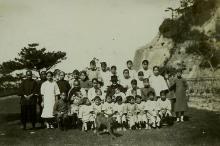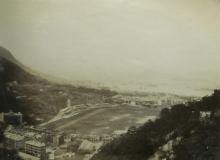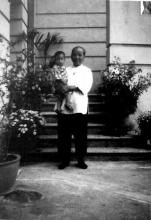The Bible Churchmen's Missionary Society (BCMS) was born out of the long-established Church Missionary Society (CMS) in October 1922, its founders wanting to show their belief in the complete trustworthiness and authority of the Bible in the face of what was perceived to be theological liberalism in the mother society. Conservative Evangelical in persuasion, its headquarters at the start of the war were situated at 14 Victoria Street, London SW1, switching to 96 when 14 was bombed out, then later having offices in Romney Street and Clapham, before sharing a building in Waterloo Road, shared with the CMS and SAMS.
From the beginning was the belief that sound theology is the foundation of effective mission. In 1925 a men's Bible Missionary Training College was founded for the training of ordinands in Clifton, Bristol. It was recognised in 1927 as a Church of England Theological College. The College was renamed Tyndale Hall in 1952. A women's college Dalton Hall was founded in 1930. These two colleges were merged with Clifton Theological College in 1972 to become Trinity College.
Work began among the Inuit people of Canada and in 1923 spread to India, then China and Burma. In 1929 that the first BCMS missionaries went to Africa. Soon the BCMS had 116 British missionaries, with 38 more in training. It employed 87 indigenous workers and 11 staff in Britain.
In 1992 the BCMS worldwide had a name change and became Crosslinks, recognising that mission is no longer ‘the west to the rest’ but ‘everywhere to everywhere’. The name also helps to make possible work in some of the 60 or so countries where "Bible", "Church" and "Missionary" are not acceptable.
Sources:
The First 25 Years of the BCMS.
Papers of the Bible Churchmen's Missionary Society.



Comments
The BCMS in Hong Kong
In its early years (1920s) the BCMS had avoided Hong Kong, thinking of it as a CMS area, but in 1930 circumstances led them to rent premises for a Foundling Home at 24 Broadwood Road, Happy Valley, for some 26 girls, originally foundlings, who had been brought from Nanning in the Guangxi Province of China by Dr and Mrs Lechmere Clift, owing to the civil war prevailing in the province. The home was run by Miss Elizabeth Lucas with the assistance of Barbara Lomas and Mildred Dibden.
In 1933 the Home moved from Happy Valley to The White House, Taipo, and in that year Miss Lucas retired leaving Miss Dibden in charge. Eleven girls in the home came forward for baptism after an address from Mr. Stott. Some of the older ones were looking forward to being Biblewomen* among their own people.
The BCMS had several missionaries in Hong Kong at this time.
Following a near-fatal bout of malaria, Miss Dibden left the White House in 1935 to be repatriated. In 1937 the Foundling Home was moved back to Kowloon as it was felt to be a healthier setting, and Iris Critchell was put in charge, followed by Miss S Birchall in 1938.
Just before the war (1940) the home was moved out to Sha Tau Kok Road in Fanling with Iris Critchell in charge again. The property is believed to be Mirror Lake Villa, a two-story traditional Chinese-style building, and it was sold by the owner to the BCMS. The home closed when the Japanese invaded in 1941, and Iris Critchell and her girls joined Mildred Dibden at the Fanling Babies' Home. In 1943 her older girls were sent away on foot to the BCMS Emmanuel Hospital in Nanning in Guangxi province, where they would be safer. They were accompanied by a Chinese BCMS member. The War seems to have brought an end to the BCMS in Hong Kong.
*Bible women were Chinese Christian women dedicated to evangelistic work, most often within churches, missions, education, and medicine.
Sources:
The First 25 Years of the BCMS.
Papers of the Bible Churchmen's Missionary Society.
Chinese Wikipedia